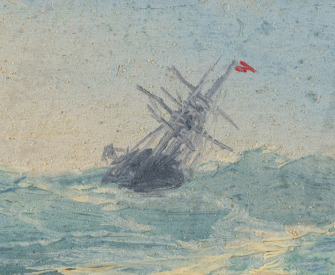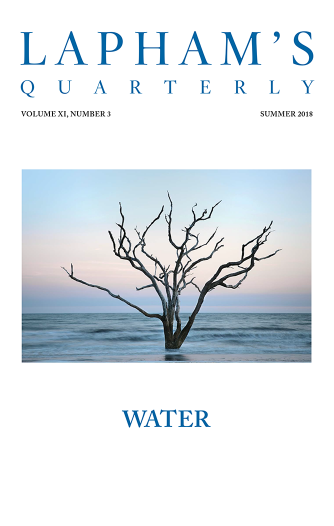We must select the illusion which appeals to our temperament and embrace it with passion if we want to be happy.
—Cyril Connolly, 1944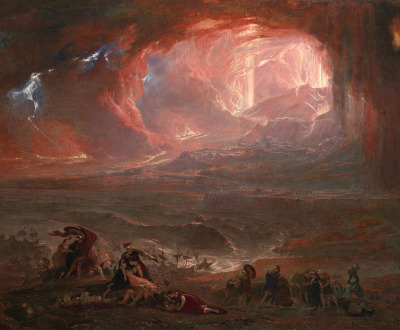
The Destruction of Pompei and Herculaneum, by John Martin, 1822. Photograph © Tate (CC-BY-NC-ND 3.0).
Around the turn of the eighth century, a sickly Anglo-Saxon monk known as Dryhthelm died in the early hours of a Northumbrian evening. Through the night his household mourned his passing. Then at dawn, as the sun returned, so did Dryhthelm, who sat up in bed with a start. All fled the undead man but his wife; she stayed, trembling in fright. “Do not fear,” he said. “I have been permitted to live among humankind once more,” and he told her what he had seen.
The journey in fleeting death had taken Dryhthelm down to a valley without end, one side of which was “terrifying with raging flames,” the other “equally intolerable owing to fierce hail and cold blasts of snow gusting and blowing away everything in sight.” Everywhere were “poor souls” who attempted to escape the intense heat by leaping into the cold and then, finding no respite, launched themselves back into the high flames to burn again. Surveying the “torture of this alternating misery,” Dryhthelm took the bilateral terror to be hell; he knew of its promised torment, its eternally unhappy agony. But his guide corrected the assumption: “Do not believe this, for this is not the hell you are thinking of.”
Dryhthelm was shaken—how could things be worse? Still farther he was led, to where the landscape grew gloomier, the covering sky even more eaten by darkness, where flames came spurting from a pit with a vile stench. He stood, “unsure what I should do or which way to turn,” unable to differentiate between the “wretched wailing” of souls and a “raucous laughter, as though some illiterate rabble was hurling insults at enemies they had captured.” Here it was at last: the infernal gloom, the precipice of damnation, the cries of suffering wretches, all the sorrowful punishments wielded by mindless, remorseless, contemptible hordes. Finally, the mouth of hell.
Dryhthelm’s story was recorded by his contemporary the Venerable Bede in the Ecclesiastical History of the English People. It is among the harrowing selections of the 2018 anthology The Penguin Book of Hell. Historian Scott G. Bruce, who collected the texts, gently proposes in his introduction that “the political calamities of the modern world have increased the currency of the concept of hell as a metaphor for torment and suffering.” From the “sulfurous and dark” mountain envisioned by the medieval Irish knight Tundale to the Nazi death camp Treblinka—about which the Russian writer Vasily Grossman commented that “not even Dante, in his hell, saw scenes like this”—the book traffics heavily in such horrid currency.
Sinking into these hells in short spurts concocted in me a kind of half-hallucinatory state, a perverse augmented reality wherein news of worldly atrocities (which often invaded my mind through Twitter, a scroll of screenshot horrors so often hideous that we saps whom it holds captive are only mostly joking about calling it “this hellsite”) correlated with my underworldly encounters. As climate change extremified wildfires raging through the American West and my native California, and as geoscientists realized the world’s oceans were retaining 60 percent more heat each year than previously thought, I flashed to Hesiod’s view of Tartarus:
The fertile earth
Being burned, roared out, the voiceless forest cried
And crackled with the fire; the whole earth boiled
And ocean’s streams, and the unfruitful sea.
As lies intensified and accrued, as doublespeak and toxic truthlessness were daily revealed as an infection spreading through the tangled canopy of government, I thought of Virgil’s view of a damned elm tree holding “swarms / of false dreams, one clinging tight under each leaf.”
The effect was accretive—day after day waking up to violence after violence, to foul injustices perpetrated with impunity, to reports that a world warmed by human action was spinning out from life support. “Little by little,” as Bede writes, “the fires merged together and became one immense conflagration.” Arthur Schopenhauer, patron pessimist philosopher for the downtrodden, declared in 1851, “The world is just a hell, and in it human beings are the tortured souls on the one hand and the devils on the other.” The idea enwrapped me, tailor-made, even while knowing that this muddle of recognition, this taking of it all personally, operated as a kind of solipsistic self-harm. What I wanted to do was harness the sense of living within a battery of worst-case scenarios and work toward something better. Stop obsessing, stop sinking down—stop casting our modern world as a hell we once thought to be an avoidable second location—and imagine a happier world, be part of building it. This did not come naturally.
The difficulty shouldn’t have been surprising. Obsessing about hell is not useful. In a 2014 study for PLOS ONE, psychologists Azim F. Shariff and Lara B. Aknin found that while certain religious concepts “may be associated with greater well-being, the belief in hell appears not to be one of them.” The research supports, more or less, what Robert Burton argued in his seventeenth-century Anatomy of Melancholy: “If there be a hell upon earth, it is to be found in a melancholy man’s heart.”
After all, what unites all imaginings of the torments of hell tends to be its symbolic status as a situation of absolute unhappiness, a statute of limitation for human hope. The idea that happiness may even be a possibility in hell is anathema to its doctrinal definition. In 1892 the progressive Catholic intellectual Saint George Mivart published an essay arguing that even a “theologian of the most severe and rigid school” must admit that “there is, and there will for all eternity be, a real and true happiness in hell” for some of its better-suited denizens. Some wicked souls will find in hell a “kind of harmony with their own mental condition.” For making the point, Mivart incurred papal condemnation, his works were put on the Index of Prohibited Books, and he was initially denied a Catholic burial.
While Mivart experienced critique and ridicule for his belief that happiness might exist in hell, Schopenhauer was attacked for his belief that happiness barely existed to begin with. “An outcry has been raised about the melancholy and cheerless nature of my philosophy,” he wrote. “But this is to be found merely in the fact that, instead of inventing a future hell as the equivalent of sins, I have shown that…there is already in the world something akin to hell.” Fast-forward a century, and his reaction of woe to a perverted world order can be heard again, this time from the Jewish Romanian philosopher Benjamin Fondane, who argued from occupied Paris in 1944 that humans “are both political beings, as citizens of social unhappiness, and metaphysical beings, as citizens of human unhappiness.” In a 1936 work responding to the rise of fascism throughout Europe, he had equated “the collective ethical category we call injustice” to a “metaphysical category—just as unclear as the preceding—which we call unhappiness.” Fondane believed that “an unhappy consciousness” suffers “from the lack of bread, of work, of freedom, of justice, but also from the hostile presence of unreality, of contradiction, of powerlessness.” It’s natural, that is, to find one’s own emotional state pegged to the rise and fall of general well-being. An individual swelters to the world’s temperature, one could say: it’s not hard to hear in Fondane’s description of the unhappy consciousness the sparks of Bede’s “immense conflagration.” It’s harder, however, to know how to avoid sinking further and further into the flames.
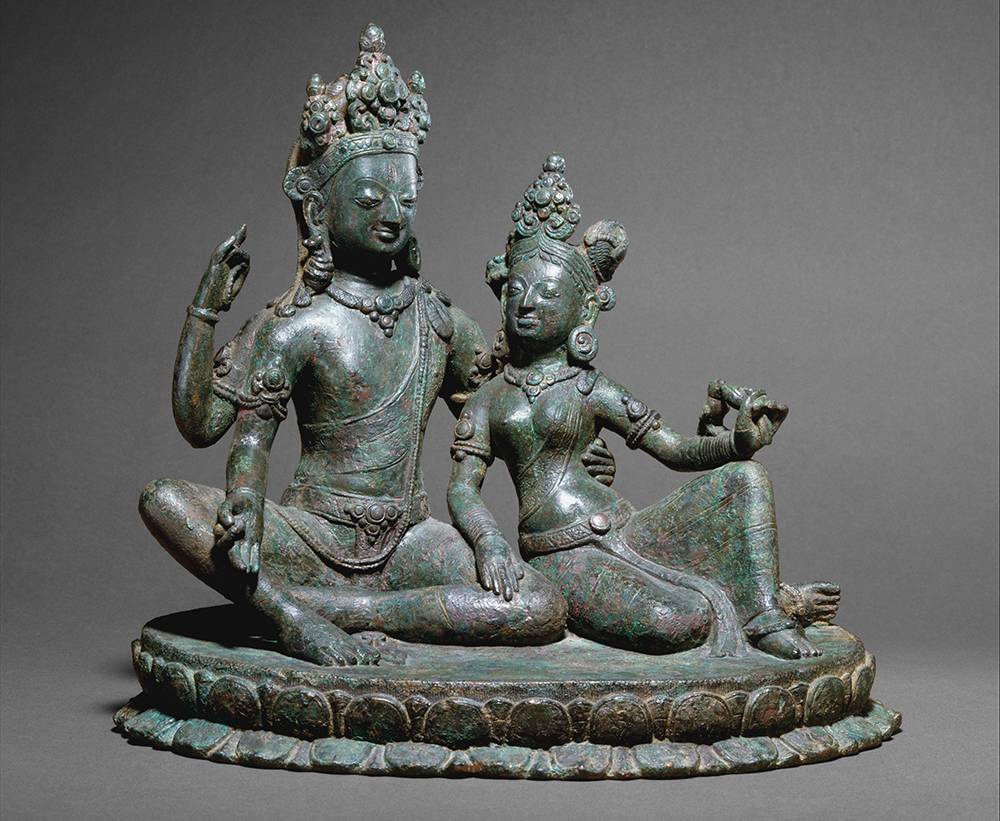
Shiva Seated with Parvati, eleventh century. The Metropolitan Museum of Art, Samuel Eilenberg Collection, Ex Coll.: Columbia University, Purchase, Rogers Fund, 1987.
Before winter descended on the East Coast, where I’ve lived for many years, I attempted to shake off an immense despair in the wake of a particularly soul-shredding set of Senate hearings by taking a solitary walk down a broad parkway near my apartment. I passed under trees shuddering in a biting wind, their branches not yet defrocked by either chill or Armageddon. I stopped at a grand statue of the Union Army only partially speckled with pigeon feces and instinctively checked my phone. My feed was full of tweets announcing an alarming but unsurprising UN report that described the effects of anthropogenic climate change anticipated over the coming decades: massive species die-offs, food shortages, farther-reaching fires. The narrow aperture through which a soul might seek out joys in life was shrinking ever further. I sat down, heavy with despair, on a bench nearby and thought: This may yet not be the hell we are thinking of.
Late last year Paradise, California, burned to the ground—the deadliest wildfire in the state’s history. The smoke spread, eventually making its gloomy way across the continent. Californians wore filtering masks for weeks, a strong, fearsome signal that our worldly home, having granted for these few billion years an oxygenated atmosphere, is on the fritz. A few months earlier, the Trump administration had released a five-hundred-page document acknowledging that the world is on track to become 7 degrees warmer by the turn of the next century—not cause for alarm, by the report’s logic, but simply an opportunity to suspend fuel-efficiency standards that keep in check only a relatively minor portion of the major problem. The world’s future is taken as sealed, no matter the human response. Over the past century and a half, the United States has been by far the earth’s largest carbon polluter, the greatest contributor to the warming world, while the effects of rising sea levels and forbidding climates are felt most profoundly by countries that are least complicit. The situation is unjust, untenable, and it remains largely unaddressed; the future of all falters at the hands of those who seem to care least. Of the far-reaching repercussions of such a myopic view, environmental activist Bill McKibben wrote, “Were the world to actually warm that much it would be a literal hell, unable to maintain civilizations as we have known them.”
To apply the name of hell to happenings on earth is easy. People do it all the time—sometimes jokingly, just for the hell of it. But the invocation, when done with purpose, is no simple matter; the response lies somewhere between projective contrivance and protective reflex. Crying hell—a kind of intensifier to crying wolf that invokes not just possible danger but absolute misery—gives a horrible situation eternal power, reveals a punitive nature so absolute in its ability to destroy the potential for human happiness that it appears divine. It’s a way of demonstrating the overwhelming severity of an issue, or it can be a method of lashing out, raising a middle finger to those acting like demons in our eyes. One might even find rising up the desire for an infernal force that could bend to our will, punish those we personally abhor.
As a superlative we turn to when we know not what else can be done, hell expresses a future-perfect regret: the losses we will have incurred, the remorse we will come to feel. It could be a case for doing more now, for maintaining the possibility of pleasure before it’s too late. Yet in an era of rising fascism, broadening inequality, and intensifying climate change—which researchers now believe could annihilate the clouds in the sky, including, one might imagine, the “eternal, / celestial pearl” Dante saw as the empyreal location of paradise—the politics of achieving the kind of happy, prosperous, and flourishing human life that Aristotle called eudaimonia are not only personal but predestinational, eschatological, existential. Amid this context, what’s one soul to do?
Blissful ignorance is tempting. The melancholic Burton noted that “entire idiots do best; they are not macerated with cares, tormented with fears and anxiety.” Keeping up boundaries doesn’t have to be idiotic, however: the life of a happy hermit focused entirely on immediate surroundings has appeal. The calm sages of parable and myth, those deliverers of wisdom and advisers of tranquility, commend keeping one’s mind away from the chaotic thrum of interconnected modern life. There’s a benefit to focusing inward, shutting out the world, and trying to minimize the noise in one’s own mind. Such was the advice, in his Gay Science, of Friedrich Nietzsche, who recommended living “in obscurity so that you are able to live for yourself! Live in ignorance of that which is most important to your age!”
Though shutting oneself off from external distraction also invites the possibility of heightening internal chaos. And besides, simply to turn away from the matters of the world carries the threat of moral abdication. Finding personal happiness through Nietzsche’s self-care regimen of separatism brings to mind the ill man encountered by nineteenth-century French writer François-René de Chateaubriand: “Whenever the sick man started to weep, he opened an umbrella, thinking it would shelter him from his tears.” What seems more likely for anyone paying attention to the world around them is that one’s umbrella is turned upside down, accumulating sorrowful tears into a Noachian flood. Terrors both near and far are unlikely to go unnoticed, given our advanced state of obsessive media entropy. Even a person attempting ignorance is alarmingly prone at all times to a content cycle—a latter-day acceleration of what was once rather quaintly called the news cycle—that evokes a self-cranked breaking wheel cast as hourly ritual.
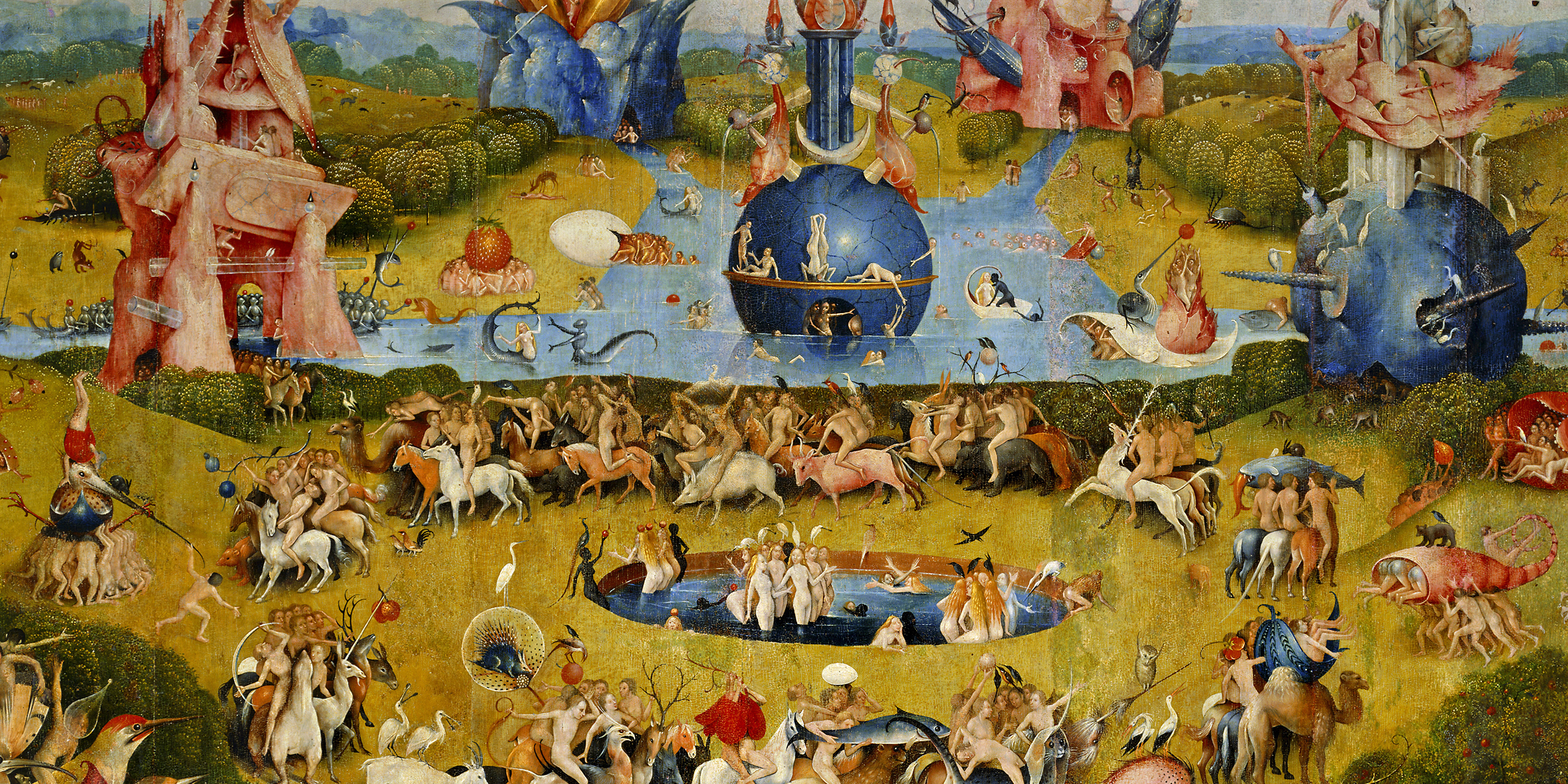
Garden of Earthly Delights (detail), by Hieronymus Bosch, c. 1500. © Erich Lessing / Art Resource, NY.
In the hell described by Ignatius of Loyola, a sixteenth-century Basque Catholic priest, inhabitants are forced “constantly to bear before their eyes the sentence of their eternal damnation, written in characters never to be blotted out.” These sufferers are “never to be able, so much as one moment, to turn their thoughts from it.” Ignatius had lived only a century into the life of the printing press. One can only imagine what he might have had to say about life with a smartphone, where a feed of the latest atrocities—along with searing-hot takes and hailstorms of canards—scrolls without end. And though despair via knowledge is nothing compared to what swallows souls in solitary cells or starves families trapped under vicious ideologues, it is a pretty sinking way to be alive. The user interface of Twitter simulates nothing so much as drowning: scrolling down the abyss, back up to refresh, then back down toward the bottom again.
Entrapment in an endless cycle of new information, with reaction heavily determined by the platform itself, encloses a user, limits action beyond responding to tweet with tweet, each defined and deformed by the interface itself. The possibility of self-contained or independent happiness collapses within this reduced self. One becomes stuck in a chamber where everything amplifies and echoes to no particular effect, with no practical purpose. The possibility of serenity is destroyed by the platform’s pandemonium—that noisy word delivered by Latin to mean “a place of all demons.” Such a state calls to mind the work of the media critic Neil Postman, who in his portentous 1985 book Amusing Ourselves to Death detailed “a great loop of impotence.” Ever-newer news—of “wars, crimes, crashes, fires, floods”—“elicits from you a variety of opinions about which you can do nothing except to offer them as more news, about which you can do nothing.” It’s fire and ice and back again—the “torture of this alternating misery” witnessed by Dryhthelm in his harrowing.
This despairing condition is not particularly useful either for one’s own emotional maintenance or for any amelioration of worldly ills. A correspondence of terror with passivity puts oneself alone and abandoned in a hell. Any promise of happy returns gets washed away in the endless slide of an infinite scroll.
But perhaps there is another way, one that strives neither to ignore the world’s despair nor to wallow in it. The search for a true, happy life cannot mean a regression to innocence, a rejection of terrible knowledge. We need to sing the notes of hell to learn the possible harmony of paradise. We know that escape from terror can never mean forgetting its meaning. In a complex world of conjugated fates, better life does not come from simply hoping for the best.
Hell, as a myth of the past or a place of the future, as a likely destination or a sword of Damocles waiting to descend, is something we know by necessity from its limits. Narratives that report what happens there or what it will be like are travelogues by touristic poets, nightmares by grim Imagineers. Its endurance as a specter haunting all of human life reveals a continual fascination with the most morbid postulation: it’s the scariest and last Schrödinger’s cat, not just the shadow of passive death but the possibility of suffering forever.
The damned fascination, however, provides a kind of despondent service: the attuned living can’t just stoically pretend that human life is trending toward Bethlehem. In 1946, Hannah Arendt published an essay called “The Image of Hell” in the year-old Commentary, in which she reviewed two books about Hitler’s crimes against the Jews of Europe. World War II was fresh in her mind; Adolf Eichmann would not stand trial for another fifteen years. “The real story of the Nazi-constructed hell is desperately needed for the future,” she wrote.
Not only because these facts have changed and poisoned the very air we breathe, not only because they now inhabit our dreams at night and permeate our thoughts during the day—but also because they have become the basic experience and the basic misery of our times. Only from this foundation, on which a new knowledge of man will rest, can our new insights, our new memories, our new deeds, take their point of departure.
The idea can also be found transmuted into Nietzsche’s mystical terms. “The way to one’s own heaven,” wrote the philosopher less than a decade before his mental collapse, “always leads through the voluptuousness of one’s own hell.”
One can’t just turn away, hoping for a deus ex machina to hose down the flames. Neither would a simple rejection of hell inherently be an embrace of happiness. The good life—a life of possibility and joy, of hope and growth, of a chance to redeem others and be redeemed in turn by their love—does not merely appear as a fantastical gift when one trains attention away from a burning world. Without fully considering a horrible situation, without examining what Arendt calls “the real story,” we grant hell the grand power of limitless myth, one that we never engage with directly but only invoke, theorize, and fear. To recognize hell in the realm of reality is to understand its true role in our lives right now—and to begin to articulate the good life we hope someday to earn. Be not distracted: the glimpses of hell do us good.
Human beings don’t all react the same way to a bad situation, however. Each person encounters hell first as an individual; for some that’s also where the response ends. In 1759, nearly two decades before publishing his Wealth of Nations, Adam Smith wondered about a proper moral response for a European man to faraway disaster in Asia. He imagined one “would make many melancholy reflections upon the precariousness of human life, and the vanity of all the labors of man, which could thus be annihilated in a moment.” But after expressing a modicum of humane sentiment, the man would move on, “pursue his business or his pleasure, take his repose or his diversion, with the same ease and tranquility, as if no such accident had happened.”
The happiness of society is the end of government.
—John Adams, 1776Smith even criticized the idea that one might care about the well-being of others enough to have it affect one’s own life. He lamented the existence of “those whining and melancholy moralists, who are perpetually reproaching us with our happiness, while so many of our brethren are in misery.” The Scotsman preferred instead a person who knew how to keep his boundaries up: one of “real constancy and firmness,” someone “wise and just who has been thoroughly bred in the great school of self-command,” who can be exposed to injustice but remain in control of “passive feelings on all occasions.” The individualist advice feels familiar: you must stay calm enough to put on your own oxygen mask.
But to keep calm, to retract back into your own fortunate life, requires being sure that the bad thing won’t ever happen to you. And some forces don’t stop at the water’s edge: the terrors of the world we frame as hell have totalizing power. They affect not only the people they hurt but also force the beholder to reckon with the possibility of undergoing the experience. Such dread collapses individual selfishness and empathy. The eschatological power of these abominations binds us all together in the fetid, omnipresent abyss. The harm in your world is your own.
The late writer Ursula K. Le Guin offered in 1973 a thought experiment that tests this idea. Inspired by a moral formulation of William James and along the lines of a scheme proposed in Fyodor Dostoevsky’s Brothers Karamazov, “The Ones Who Walk Away from Omelas” describes an absolutely happy society whose pure joy is predicated on the total misery of one captive child. Nothing can be done for the child or “all the prosperity and beauty and delight of Omelas would wither and be destroyed…to throw away the happiness of thousands for the chance of the happiness of one: that would be to let guilt within the walls.” Most accept the bargain. But others simply walk away and never come back. Where do they go? The narrator cannot describe the place and admits “it is possible that it does not exist.”
The reaction of these Omelans is not individualist, but neither is it one of “melancholy moralists.” They walk toward an unknown, toward the possibility of a paradisiacal life that is not contingent on the unremitting torture of another person. They abandon persistent bliss when that bliss is revealed to be corrupt and, per Arendt, “take their point of departure.” The scholar Shoshana Milgram Knapp has argued that by bringing the reader to this new horizon, Le Guin showcases “the limits of dissent.” It is not possible—even in Omelas, a city of fable conceived by a master of speculative fiction—to reorganize in small increments a society with such an elemental atrocity at its heart. The Omelans who exit are not turning their backs: they demonstrate the extraordinary difficulty of recognizing malevolence and refusing to countenance it.
In the mid-1930s, Fondane wrote of similar “extreme limits” of a society. He conceived the possibility of “permanent mobilization against a reality that is hostile, inexplicable, and absurd.” But such a situation, he argued, is often paired with “a tenacious dual will to ‘rationalize’ or ‘chaoticize’ ” that reality, “to make it favorable, to tailor it to suit us or to make ourselves conform to it.” Staying in Omelas, that is, generally gets presented as the most reasonable choice.

Wine-drinking scene, detail of a hand-painted rumal, India, c. 1640. The Metropolitan Museum of Art, Rogers Fund, 1928.
In the case of Fondane, history offers a strange slant rhyme. In March 1944 he was deported to Auschwitz. The year before, a rebellion had broken out at Treblinka, about which Fondane was likely unaware; he was gassed to death in October, and Grossman published his essay “The Hell of Treblinka” in November. In the essay, Grossman details how prisoners were forced by Nazi guards to sing a song “exhorting the prisoners to humility and obedience; their reward would be ‘a little, little happiness, that would flash by in a single moment.’ ” The promised happiness, however, would never be granted in such an awful context. Instead it would be conjured only during what Grossman called the “one happy day in the living hell of Treblinka,” which dawned “thanks to the insane audacity of people who had nothing to lose.” The prisoners rose up in rebellion; most lost their lives, but they destroyed the camp apparatus.
Also in 1943, Jean-Paul Sartre completed his play No Exit, which includes the line “Hell is other people”—an oft-quoted mantra for misanthropes. But it misses a step. Hell is what happens when we reduce the humanity of other people; hell is what people make by thinking of them as “others” in the first place. In his essay on Treblinka, Grossman rejects “racial, national, and every other kind of exceptionalism” and argues that “we need to speak about the responsibility of every nation and every citizen for the future.” We all must, he wrote, be “duty-bound” to humanity as a whole.
It’s not easy to do, and it’s impossible to do alone—one can’t be duty-bound to humanity at large without concern for another. Smith’s assertion that one should stay self-composed even while a faraway land undergoes a fatal calamity is sensible advice to get through one’s daily life without falling apart. But the strange and terrible truth in a world spewing forth the deathly effects of human-caused climate violence, one thundering with violent shows of inane, racist force—our world—is that every day presents new reminders of how inseparable care for one life is to care for another. The hell that haunts us does so with uncertainty: we don’t know when and if it will come, how and why it will come for us. Even so, our actions have consequences for the politics of life itself. To allow an awful reality to build around us by casting it out of mind—or to imagine it as powerful beyond our ken—is to frame hell’s torments as inescapable, every struggle as eternal, every strife as divine. All of which gives supernatural credit to mortal malignancy—more than it deserves.
Late in life Charles Darwin reflected on the state of the world, “whether there is more of misery or of happiness; whether the world as a whole is a good one or a bad one.” He felt that the continual propagation of species indicated that “sentient beings have been formed so as to enjoy, as a general rule, happiness.” But his belief in the power of evolution—“that man in the distant future will be a far more perfect creature”—did not come without a sense of remorse about the possible destruction of earth. “It is an intolerable thought,” he wrote, that “sentient beings are doomed to complete annihilation after such long-continued slow progress.”
Darwin’s fear was of an external destructive force, a possibility posed by physicists in his day around which there is now scientific consensus: “that the sun with all the planets will in time grow too cold for life.” But his fear of possible exogenous annihilation refracts in my mind to a fear for the beings alive now. He hoped we wouldn’t die in a freeze from above; I’m praying we can save ourselves from the fiery pit below, the one that we humans are installing on our crusty surface. I’m praying we can fight for the possibility of making it to the death of the sun.
Months after my first walk down the parkway, I found myself there again, this time not alone. Winter had come and left. The trees were bare, the branches’ forking paths exposed in the freeze, budding with the promise of new leaves. Under the boughs I was talking schemes and possible futures with the woman I love. We were planning, poking at juncture points that might support our wobbly dreams, wondering what branching out might greet us on the other side of a decade.
I was trying to look up—at the sky, where paradisiacal clouds still for now remained—instead of down. After months of my mind figuring against the firelight of hellish horrors, something strange had happened: I began wanting again to learn about goodness and hope. I looked around my life to the people I love, and to the people I know who love other people the way I try to love people—that is, all we human beings struggling to be present for one another, who seek strength when finding ourselves too frail to act.
Ovid wrote in his Metamorphoses that when Orpheus went down to the underworld to find his love, Eurydice, “all the places that he’d seen before / He recognized again.” He passed through these horrors to find her and began to lead her back into the light. “There hand in hand they stroll, the two together,” Ovid wrote. “Sometimes he follows as she walks in front.” I chose to put out of mind what happened next in the myth. My wife and I—we are not living a myth. We got engaged in view of a glacier we knew might not survive our lifetimes. We’re alive in the world, this world, to which we are beholden, as we are to each other, as we are to all. We are only two, but two is a beginning. I grabbed her left hand with my right and did not let go.
